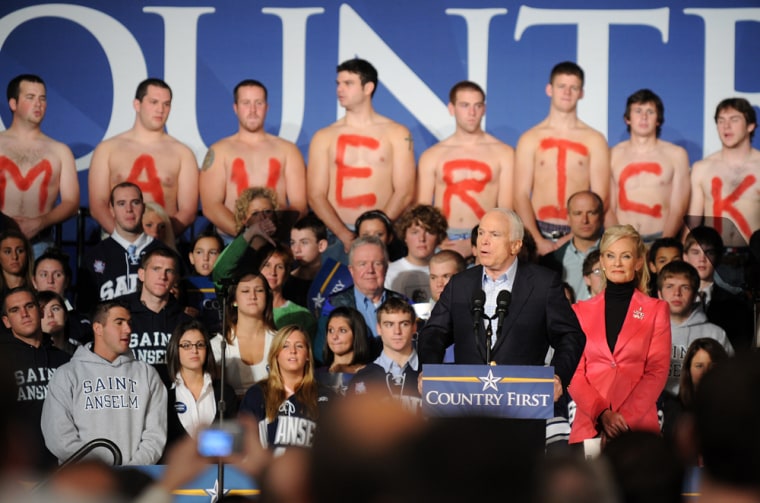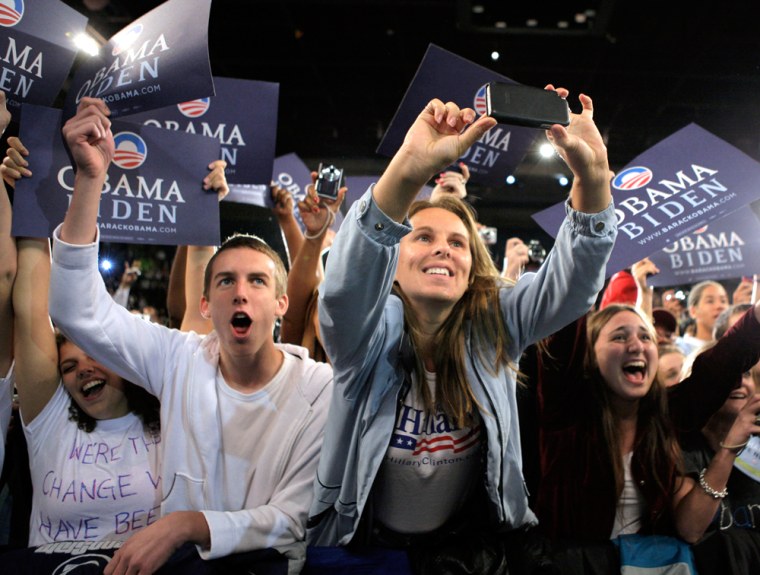There is always talk about the impact young voters could have in choosing the next president. But this truly could be a breakout year for them.
Among the factors: nearly 2-to-1 support for Democratic nominee Barack Obama among 18- to 29-year-olds and a seasoned get-out-the-vote effort that has seen young voter participation steadily rising since 2000.
An AP-Yahoo News Poll conducted earlier this month found that, among 18- to 29-year-old likely voters, 60 percent supported Obama, 33 percent Republican John McCain and 5 percent independent Ralph Nader. The poll had a margin of error of 9 percentage points.
When asked, "Do any of the following words describe how you feel about the upcoming presidential election?" 61 percent of the young respondents chose "interested," while 48 percent chose "hopeful."
But, able to choose more than one answer, only about a third of these likely young voters said they were "excited" about the election and 47 percent were "frustrated."
These are the sort of answers one might expect from a group of voters who have historically been pegged as Election Day wild cards, but who have also shown they can be counted on — helping get both Ronald Reagan and Bill Clinton elected, for instance.
Show up big this time — and they could put Obama over the top. A lesser youth showing, however, would likely benefit McCain.
"So turnout suddenly becomes a pretty big ingredient," says Peter Levine, director of Tufts University's Center for Information and Research on Civic Learning and Engagement, otherwise known as CIRCLE.
That is especially true in key swing states, such as Florida, North Carolina, Ohio, Pennsylvania and Virginia. In North Carolina, for instance, the most recent tally available shows 579,858 new registrants who are eligible to vote this year. Many of them 20somethings, they represent about 9 percent of the state's registered voters and could be a difference-maker in a close race, particularly if they support one candidate more heavily than another.

The huge influx of new voters is part of a larger national trend.
Rock the Vote, which focuses on young voters, has registered more than 2.3 million voters this year, compared with more than 1.4 million voters in 2004, already a standout year for youth turnout.
In that election, about 47 percent of 18- to 24-year-olds voted, up from 36 percent in 2000, according to the Census Bureau. While their impact was not felt as greatly because their vote was more evenly split between George W. Bush and John Kerry, no other age group increased its turnout by more than 5 percentage points.
And some political scientists expect those numbers to be topped yet again, especially since young voters have been a long-standing centerpiece of Obama's campaign.
Besides college students, his supporters include people like Elvis Garcia, a 19-year-old Chicagoan who recently completed a training and education program called Jobs For Youth and is looking for employment — and a change in the country's leadership.
"I want this time to be different," says Garcia, who has many peers who also plan to vote.
They may be considered unlikely voters by some. But political scientist Molly Andolina expects many of them will make it to the polls in November as they have done since the leadoff Iowa caucuses in early January that put him on the path to victory in his hard-fought primary contest with Hillary Rodham Clinton.
"This cohort has shown a lot of resilience," says Andolina, a professor at DePaul University who studies young-voter habits. "Prior to Obama's win in Iowa — when it was known that he was popular among youth — pundits declared that they'd never make it out, in the cold of January, when college and universities were still on break, to spend an hour or more caucusing ...
"But they did. And he won."
Still others wonder if young voters' support for Obama might be even stronger than the polls have been showing, since many under-30s don't have land telephone lines.
Because of this, Sam Wang, a professor at Princeton University who helps oversee Princeton Election Consortium, estimates that, on average, national polls could be understating Obama's margin over McCain by about 1 percentage point.
But that's a minor issue compared with barriers to voting some young people are facing, says Matthew Segal, the young executive director of the Student Association for Voter Empowerment.
"Young voters don't suffer from a lack of interest. They suffer from a lack of access," Segal says.
In this election, he has heard complaints about everything from difficult registration requirements to fliers that falsely tell college students they will lose their student loans if they do not vote in their home state.
Segal's group, also called SAVE, was founded in reaction to voting problems college students faced in Ohio and other states in 2004. Those issues included polling facilities that had trouble handling the influx of young voters.
Students at Washington University in St. Louis were so frustrated after similar problems there that the university persuaded the county to put a polling place on campus for this election. It will serve about a third of its students.
The university also will provide shuttles to students who vote off campus, says Jordan Aibel, a sophomore who helped lead an effort that registered 2,000 additional students.
"There's a tangible sense of excitement and a desire to get involved," Aibel, an independent who is still deciding on a candidate, says of the mood on campus.
Casby Stainback, a young Republican at Mary Baldwin College in Staunton, Virginia, who is supporting McCain, has noted the enthusiasm, too.
She finds it encouraging, even if much of it is not for her candidate — and even if Obama wins.
"The more people who participate," she says, "the better off we'll be."
